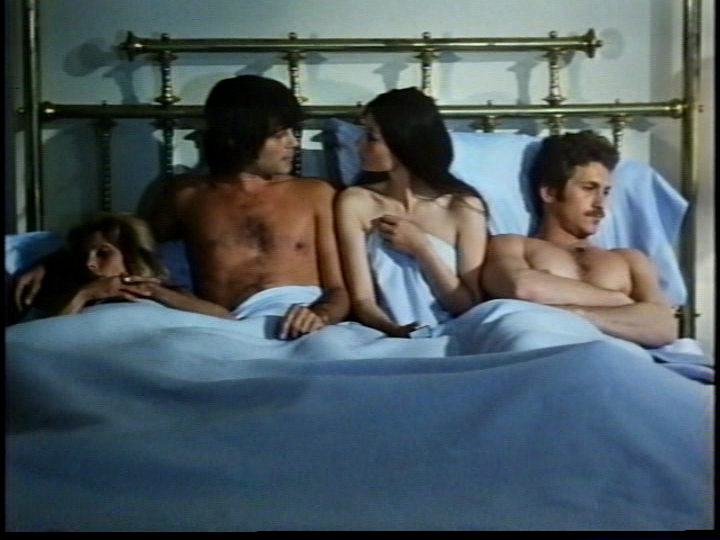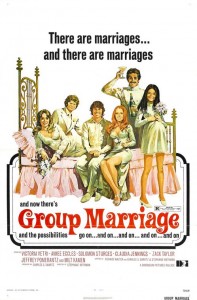|
Genres, Themes, Actors, and Directors:
- Claudia Jennings Films
- Comedy
- Counterculture
- Sexuality
- Stephanie Rothman Films
Review:
Four years after the release of Paul Mazursky’s Bob & Carol & Ted & Alice (1969), maverick feminist director Stephanie Rothman made this much bolder exploitation comedy about the same topic: poly-amorous relationships. While Mazursky’s film was notable for introducing this timely concern to mainstream audiences in a crowd-pleasing fashion, Rothman’s variation dares to take B&C&T&A‘s concerns to the next logical step, as the group of adults in question actually carry out their desire to experiment with shifting sexual partnerships and a communal living arrangement. The script is often clunky (a pair of onlooking gay male neighbors are especially poorly handled), and the performances less-than-fine-tuned — but one nonetheless gets the sense that Rothman is genuinely concerned with exploring what a “group marriage” might look like, and what some of the obstacles might be, including (surprisingly) one member’s ultimate desire for more freedom than even such a radically-conceived “marriage” allows for. Meanwhile, it’s refreshing as always to see Rothman’s attempts to infuse her female characters with unexpected strengths and skills — gorgeous Eccles, for instance, is a whiz at fixing cars, while Jennings is a no-nonsense lawyer.
Note: Watch for the film’s most unintentionally giggle-worthy moment, as Vetri encounters Taylor on the beach for the first time.
Redeeming Qualities and Moments:
- A clever spoof of shifting sexual mores

Must See?
Yes, simply to see one of Rothman’s iconic exploitation films — and as an interesting counterpoint to Bob & Carol & Ted & Alice (they would make a provocative double-bill).
Categories
Links:
|


One thought on “Group Marriage (1973)”
A tentative once-must – because, though the film has a unique and provocative premise, it’s extremely flawed (for a comedy, it’s not very funny)…and besides, it’s a forgotten film and quite difficult to find.
I saw this once before, years ago when I was still living in Tokyo. At the time, (unlike now) I was keeping Peary’s book purely as a checklist – without writing down any thoughts on anything I watched. I happened upon ‘GM’ in a Tokyo video store as I was browsing (ah, the days of video stores!).
Seeing it again, I realize I had completely forgotten everything about the film – except that it has an attractive cast.
What I do like about it is: as stated in the assessment, it’s an interesting ‘response’ to ‘Bob & Carol & Ted & Alice’. The main problem with ‘B&C…’ is that its characters, though living in the ’60s, are still too tied to the ’50s (a little too angst-ridden and prone to analyzing their feelings). The men and women in ‘GM’, on the other hand, more fully represent the ’60s generation of free love – and are less prone toward feeling guilty about their sexuality. That makes for a more easy-going approach to the subject matter.
But, unfortunately, real damage is done here because the dialogue is – for the most part – not all that inspired.
Not only is a sextet (if you will) a challenge for the six main characters, but it also proved – for the writers – to be a matter of biting off more than they could chew. It’s almost as if the writers couldn’t really decide on the proper angle for the story (which, as a result, also makes it a film a little difficult to write about). It’s clear that the group was to consist of six people with distinct, unchallenged hetero leanings – and that the six were to agree to be faithful inside the group (“A marriage is a marriage – even this one.”) But, oddly enough (esp. for a film with just about no actual sex in it), we never really see how the group operates *as* a (sexual) group…aside from little things like the discomfort when six people share a bathroom at the same time. What if the three men desire one particular woman at the same time? And would there really be *no* whiff of bisexuality? Ever? Even out of curiosity in such intimate quarters?
The film contains a few esp. weird elements: i.e., when an ad is placed in an underground paper for a sixth person to complete the group, we see a series of people answering the ad…none of them being quite as garden variety hetero as the other group members. This is all played for laughs but, at the same time, there appears to be the suggestion that ‘normal het is better’ (i.e., a bisexual guy is just about actually thrown off of their property, a lesbian woman is depicted not only as very butch but almost carnivorous, etc.).
As well, it’s on odd turn in the story when the group begins to experience hate crimes where they live. ~though the attacks on their home would probably not happen if it weren’t for what amounts to my favorite scene: the six are interviewed for television. (That scene is actually clever and funny – it’s almost as though a ghost writer had been brought in – not only for here, but to occasionally add something humorous.)
And, yes, the gay couple next door…that’s a bit much. Personally, I don’t mind the stereotyping as much as the fact that they’re given nothing witty to say. (But at least they are given some dignity at the end of the film.)
It really is a shame this film isn’t better. It’s a terrific premise…maybe someday someone else will get it right.